| Listing 1 - 10 of 22 | << page >> |
Sort by
|
Book

ISBN: 9783110441031 3110441039 9783110435283 3110435284 9783110429336 3110429330 Year: 2016 Volume: 90 Publisher: Berlin Boston
Abstract | Keywords | Export | Availability | Bookmark
 Loading...
Loading...Choose an application
- Reference Manager
- EndNote
- RefWorks (Direct export to RefWorks)
"This festschrift honours Günter Stemberger on the occasion of his 75th birthday on 7 December 2015 and contains 41 articles from colleagues and students. The studies focus on a variety of subjects pertaining to the history, religion and culture of Judaism - and, to a lesser extent, of Christianity - from late antiquity and the Middle Ages to the modern era"--
Judaism. --- Jews --- Religions --- Semites --- Religion --- Ancient and Medieval Judaism. --- Christianity in its Beginnings. --- Rabbinic Judaism.
Book
ISBN: 178204647X 1571139516 Year: 2015 Publisher: Rochester, New York : Camden House,
Abstract | Keywords | Export | Availability | Bookmark
 Loading...
Loading...Choose an application
- Reference Manager
- EndNote
- RefWorks (Direct export to RefWorks)
Although issues of futurity have become more and more central to literary and cultural studies in recent years, especially in environmental criticism, no scholarly work has yet addressed the topic of beginnings in American poetry in sufficient scope or detail or with adequate theoretical background. This book is a study of how beginnings are made in American poetry. It borrows Walt Whitman's term "future-founding" to establish a theory of poetic beginnings that asks how poetry relates to notions of the future and how it imagines, constructs, and influences this future in the present. Furthermore, it seeks to change the way literary scholars think about futurity with regard to American poetry: they most often conceive of it in terms of newness alone, yet a deeper theorization of beginningsmust open up new ways of understanding the complexities of this relation. With chapters on Whitman, William Carlos Williams, Langston Hughes, Muriel Rukeyser, Allen Ginsberg, and future-founding poetry after 9/11, this book explains how American poetry makes its beginnings, with what means and to which political and aesthetic ends, and how it addresses fundamental questions about the nature of futurity itself. Sascha Pöhlmann is Associate Professor of American Literary History at Lüdwig-Maximilians-University, Munich.
American poetry --- Openings (Rhetoric) --- Future, The, in literature. --- Poetics. --- History and criticism. --- Poetry --- Future in literature --- Beginnings (Rhetoric) --- First lines (Rhetoric) --- Opening sentences --- Rhetoric --- Technique --- Aesthetic. --- American poetry. --- Beginnings. --- Future. --- Literature. --- Political. --- Twenty-First Century. --- Whitman.
Book
ISBN: 0805804110 Year: 1989 Publisher: Hillsdale, N.J. Lawrence Erlbaum Associates
Abstract | Keywords | Export | Availability | Bookmark
 Loading...
Loading...Choose an application
- Reference Manager
- EndNote
- RefWorks (Direct export to RefWorks)
Journalism --- Closure (Rhetoric) --- Openings (Rhetoric) --- Beginnings (Rhetoric) --- First lines (Rhetoric) --- Opening sentences --- Rhetoric --- News writing --- Authorship --- Endings (Rhetoric) --- Last lines (Rhetoric) --- Peroration
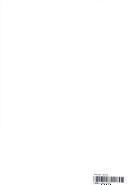
ISBN: 9783487114620 3487114623 Year: 2001 Publisher: Hildesheim Olms-Weidmann
Abstract | Keywords | Export | Availability | Bookmark
 Loading...
Loading...Choose an application
- Reference Manager
- EndNote
- RefWorks (Direct export to RefWorks)
Littérature épistolaire byzantine. --- Byzantine letters - Indexes --- Byzantine literature - Indexes. --- Byzantine letters --- Openings (Rhetoric) --- Beginnings (Rhetoric) --- First lines (Rhetoric) --- Opening sentences --- Rhetoric --- Byzantine literature
Book
Year: 2021 Publisher: New York, NY : Fordham University Press,
Abstract | Keywords | Export | Availability | Bookmark
 Loading...
Loading...Choose an application
- Reference Manager
- EndNote
- RefWorks (Direct export to RefWorks)
The beginning is both internal and external to the text it initiates, and that noncoincidence points to the text’s vexed relation with its outside. Hence the nontrivial self-reflexivity of any textual beginning, which must bear witness to the self-grounding quality of the literary work— its inability either to comprise its inception or to externalize it in an authorizing exteriority. In a different but related way, the fact that they must begin renders our lives and our desires opaque to us; what Freud called “latency” marks not only sexuality but human thought with a self-division shaped by asynchronicity.From Henry James’s New York Edition prefaces to George Eliot’s epigraphs, from Ovid’s play with meter to Charles Dickens’s thematizing of the ex nihilo emergence of character, from Wallace Stevens’s abstract consideration of poetic origins to James Baldwin’s, Carson McCullers’s, and Eudora Welty’s descriptions of queer childhood, writers repeatedly confront the problem of inception. Inception introduces a fundamental contingency into texts and psyches alike: in the beginning, all could have been otherwise.For Kevin Ohi, the act of inception, and the potential it embodies, enables us to see making and unmaking coincide within the mechanism of creation. In this sense, Inceptions traces an ethics of reading, the possibility of perceiving, in the ostensibly finished forms of lives and texts, the potentiality inherent in their having started forth.
American literature --- English literature --- Openings (Rhetoric). --- LITERARY CRITICISM / Semiotics & Theory. --- Baldwin, James. --- Beginnings. --- Defoe, Daniel. --- Dickens, Charles. --- Eliot, George. --- Friedrich, Su. --- James, Henry. --- McCullers, Carson. --- Milton, John. --- Oppen, George. --- Ovid. --- Shakespeare, William. --- Stevens, Wallace. --- Welty, Eudora. --- Wordsworth, William. --- beginnings. --- birth. --- contingency. --- literary form. --- origins. --- potentiality. --- History and criticism --- Theory, etc. --- History and criticism --- Theory, etc. --- Baldwin, James. --- Beginnings. --- Defoe, Daniel. --- Dickens, Charles. --- Eliot, George. --- Friedrich, Su. --- James, Henry. --- McCullers, Carson. --- Milton, John. --- Oppen, George. --- Ovid. --- Shakespeare, William. --- Stevens, Wallace. --- Welty, Eudora. --- Wordsworth, William. --- beginnings. --- birth. --- contingency. --- literary form. --- origins. --- potentiality.
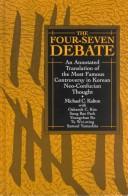
ISBN: 0585060916 9780585060910 0791417514 9780791417515 0791417522 9780791417522 1438408188 Year: 1994 Publisher: Albany State university of New York at Albany
Abstract | Keywords | Export | Availability | Bookmark
 Loading...
Loading...Choose an application
- Reference Manager
- EndNote
- RefWorks (Direct export to RefWorks)
This book is an annotated translation, with introduction and commentary, of the correspondence between Yi Hwang (T'oegye, 1500-1570) and Ki Taesung (Kobong, 1527-1572) and between Yi I (Yulgok, 1536-1584) and Song Hon (Ugye, 1535-1598), known as the Four-Seven Debate, the most famous philosophical controversy in Korean Neo-Confucian thought. The most complex issues and difficult tensions in the great Neo-Confucian synthesis are at the juncture between the metaphysics of the cosmos and the human psyche. The Four-Seven Debate is perhaps the most searching examination of this tension ever carried out.
Four beginnings and seven feelings thesis --- Neo-Confucianism --- Philosophers, Korean --- K9032 --- K9040 --- Four-seven thesis --- Correspondence --- Korea: Philosophy and thought -- works by individual philosophers --- Korea: Philosophy and thought -- schools -- Confucianism --- Four beginnings and seven feelings thesis. --- Philosophers --- Correspondence. --- NEO-CONFUCIANISM --- RELIGION --- Religion --- Neo-confucianism
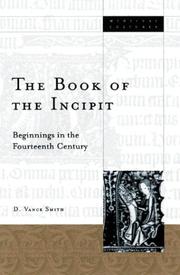
ISBN: 0816637601 081663761X 0816692580 Year: 2001 Publisher: Minneapolis (Minn.): University of Minnesota
Abstract | Keywords | Export | Availability | Bookmark
 Loading...
Loading...Choose an application
- Reference Manager
- EndNote
- RefWorks (Direct export to RefWorks)
Christian poetry, English (Middle) --- English language --- Incipits --- Openings (Rhetoric) --- Rhetoric, Medieval --- Beginnings (Rhetoric) --- First lines (Rhetoric) --- Opening sentences --- Rhetoric --- Early printed books --- Manuscripts, Medieval --- Germanic languages --- History and criticism --- Langland, William, --- Langland, Robert, --- Langland, Uĭli︠a︡m, --- Technique.
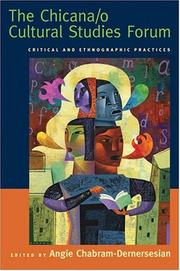
ISBN: 0814772919 0814716970 9780814716977 9780814772911 9780814716311 0814716318 9780814716328 0814716326 Year: 2007 Publisher: New York New York University press
Abstract | Keywords | Export | Availability | Bookmark
 Loading...
Loading...Choose an application
- Reference Manager
- EndNote
- RefWorks (Direct export to RefWorks)
The Chicana/o Cultural Studies Forum brings together a diverse group of scholars whose work spans the interdisciplinary fields of Chicana/o studies and cultural studies. Editor Angie Chabram-Dernersesian provides an overview of current debates, locating Chicana/o cultural criticism at the intersections of these fields. She then acts as moderator of a virtual roundtable of critics, including Frances Aparicio, Lisa Lowe, George Lipsitz, Wahneema Lubiano, Renato Rosaldo, José David Saldívar, and Sonia Saldívar-Hull. This highly collaborative and deeply interdisciplinary project addresses the questions: What is the relationship between Chicana/o studies and cultural studies? How do we do cultural studies from within Chicana/o cultural studies? How do Chicana/o cultural studies formations (hemispheric, borderland, and feminist) intermingle? The lively conversations documented here attest to the vitality and spirit of Chicana/o cultural studies today and track the movements between disciplines that share an interest in the study of culture, power relations, identity, and representation. This book offers a unique resource for understanding not just the development of Chicana/o cultural studies, but how new social movements and epistemologies travel and affiliate with progressive forms of social inquiry in the global era.
Culture --- Mexican Americans --- Cultural sociology --- Sociology of culture --- Civilization --- Popular culture --- Chicanos --- Hispanos --- Ethnology --- Study and teaching --- Intellectual life --- Social aspects --- #SBIB:39A74 --- Etnografie: Amerika --- Chicanao. --- beginnings. --- book. --- captures. --- character. --- collective. --- cultural. --- deeply. --- exemplified. --- since. --- studies. --- that.
Book
ISBN: 3846764760 Year: 2019 Publisher: Paderborn Brill | Fink
Abstract | Keywords | Export | Availability | Bookmark
 Loading...
Loading...Choose an application
- Reference Manager
- EndNote
- RefWorks (Direct export to RefWorks)
Niemand kann sagen, was vor dem Anfang des Lebens war und was nach dessen Ende kommt - oder ob es überhaupt Anfang und Ende gibt, die unabhängig sind von kulturellen Mustern. Das Weltbild der Moderne baut allerdings auf solchen Unterscheidungen auf. Denken wir nur zum Beispiel an Immanuel Kant, der dem Menschen einen freien Willen zugesteht, weil er die Fähigkeit hat, sich an den Anfang von etwas zu setzen. Der vorliegende Band versammelt Texte aus verschiedenen kulturwissenschaftlichen Disziplinen, die unterschiedliche Perspektiven auf Anfang und Ende entwickeln und, an ausgewählten Beispielen, chronologisch und thematisch ein weites Feld abdecken - von der Antike bis zur Postmoderne, von historischen Quellen bis zum Film, von der Philosophie bis zur Medienwissenschaft, von William Shakespeare bis Michael Ende, von ersten Sätzen in der Literatur bis zu Schlüssen in der Musik. Das ist sicher nicht das Ende der Beschäftigung mit dem Thema, aber immerhin ein - hoffentlich vielversprechender - Anfang!
Anfang --- Ende --- Kulturwissenschaft --- Philosophie --- Medienwissenschaft --- Antike --- Postmoderne --- Film --- Shakespeare --- Michael Ende --- Literatur --- Musik --- Kultur --- Anfänge --- Schlüsse --- Culture --- Literature --- Beginnings --- Endings --- Kant, Immanuel, --- Kritik der ästhetischen Urteilskraft (Kant, Immanuel)
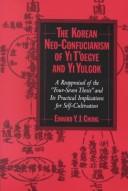
ISBN: 0585090947 9780585090948 0791422755 0791422763 0791499111 9780791422755 9780791422762 9780791422762 Year: 1995 Publisher: Albany SUNY Press
Abstract | Keywords | Export | Availability | Bookmark
 Loading...
Loading...Choose an application
- Reference Manager
- EndNote
- RefWorks (Direct export to RefWorks)
This comparative study of Yi T'oegye (1501-1570) and Yi Yulgok (1536-1584), Korea's two most eminent Neo-Confucian thinkers, is a seminal work on the Four-Seven Debate, the most significant and controversial intellectual event in the Korean Confucian tradition. The Four-Seven thesis, a magnificent example of East Asian Confucian discourse at its best, remains each thinker's masterpiece, a compressed but integrated systemization of metaphysics, ethics, and spirituality. It addresses fascinating philosophical, moral, and psychological questions about the fundamental problem of feelings and emotions, as well as their implications for moral and spiritual self-transformation.This book is indispensable for those interested in Korean thought or intellectual history. It will enable specialists in Confucian studies to understand unique paradigms of Korean Neo-Confucianism. It will stimulate comparative philosophers or religionists and general humanists to consider Korean Neo-Confucianism seriously as a major resource for understanding East Asian philosophy and religion.
Four beginnings and seven feelings thesis. --- Neo-Confucianism --- Philosophy, Korean. --- Korean philosophy --- Four-seven thesis --- Yi, Hwang, --- Yi, I, --- Li, Er, --- Li, Ligu, --- Li, Shuxian, --- Ligu, --- Sŏktam, --- Ujae, --- Yi, Sŏk-tam, --- Yi, Sŏktam, --- Yi, Ujae, --- Yi, Yulgok, --- Yul-gok, --- Yulgok, --- 李珥, --- 李 珥, --- 이 이, --- 이이, --- Four beginnings and seven feelings thesis --- Philosophy, Korean --- K9030.50 --- K9032 --- K9040 --- K9125.50 --- Confucianism --- Philosophy, Chinese --- History --- Korea: Philosophy and thought -- history -- Chosŏn period (1392-1910) --- Korea: Philosophy and thought -- works by individual philosophers --- Korea: Philosophy and thought -- schools -- Confucianism --- Korea: Genealogy and biography -- biography -- Chosŏn period (1392-1910) --- Yi, Hwang --- Yi, Hwang, - 1501-1570 --- Yi, I, - 1536-1584
| Listing 1 - 10 of 22 | << page >> |
Sort by
|

 Search
Search Feedback
Feedback About UniCat
About UniCat  Help
Help News
News